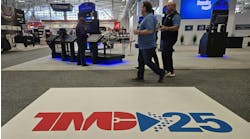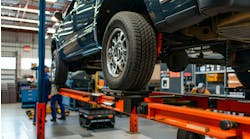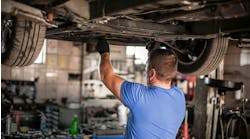Overlooking costs and regulations past the pump is one of the most common mistakes fleets make when switching to alternative fuels. Figuring total cost-of-ownership - including infrastructure, garaging and maintenance - is an important step in choosing the right fuel and can help you avoid unforeseen expenses.
If you’re modifying a repair garage or building new to suit your green fleet, here are the top questions to ask before you begin.
1. Is your facility code compliant?
The first step in readying a garage for alternative fuels is making sure your facility is compliant with general code requirements for traditional liquid fuels. Since propane autogas has similar requirements to gasoline and diesel, facilities operating within these regulations can easily accommodate propane autogas-fueled vehicles without modifications for ventilation, gas detection or electrical requirements.
However, this is not the case for all alternative fuels. For example, a CNG repair and maintenance facility requires additional gas detection and ventilation equipment.
Secondly, a review of national codes and regional compliance codes with your local Authority Having Jurisdiction (AHJ) is recommended before making any changes. The two codes fleets need to review for propane autogas-fueled vehicles can be referenced online at www.nfpa.org - the website for the National Fire Protection Agency (NFPA).
2. Will the facility provide minor repairs, major repairs or both?
Repair garages are placed in two different categories for code purposes. A major repair garage is where actions such as engine overhauls, painting, bodywork and motor vehicle fuel tank drainage are performed.
A minor garage is used for basic tasks, such as tune-ups, parts replacement and fluid changes.
Major and minor repairs may take place in independent facilities or can be performed in separate areas within the same building.
A review of compliance to existing local and national codes for liquid fuels is recommended before making modifications to facilities.
With propane autogas, there are no additional requirements for minor and major repair facilities. They are the same as gasoline and diesel requirements.
3. Will fuel be stored or dispensed inside the facility?
If you’re building new or planning to store and dispense alternative fuels at an existing facility, you may need to review code requirements in the jurisdiction where your facility is located. Propane autogas performs safely under all operating conditions when properly stored, dispensed and used, and indoor refueling with propane autogas is permitted in facilities that comply with NFPA 58 and NFPA 30A and jurisdictional codes.
If you store propane autogas outside the repair facility, rules may apply for where aboveground tanks can be stored and placed.
For instance, aboveground propane autogas storage tanks must be separated by at least 15’ from devices that dispense liquefied or gaseous motor vehicle fuels. If the facility also has aboveground CNG or LNG tanks, the propane autogas tank must be separated by at least 20’ from those fuels.
No matter the alternative fuel, it’s always good to have physical and security protection in accordance with local laws.
For more information about the benefits of alternative fuels and resources on how fleets can save money and reduce emissions with propane autogas, visit www.autogasusa.org.
Michael Taylor is the director of autogas business development for the Propane Education & Research Council (PERC), an organization that promotes the safe, efficient use of odorized propane gas as a preferred energy resource through research and development (www.propanecouncil.org). Prior to joining PERC in 2012, Taylor served as director of fleet management at Heritage Propane for four years and had a 22-year career in the school transportation industry with Blue Bird Corporation, the nation’s largest school bus manufacturer.



